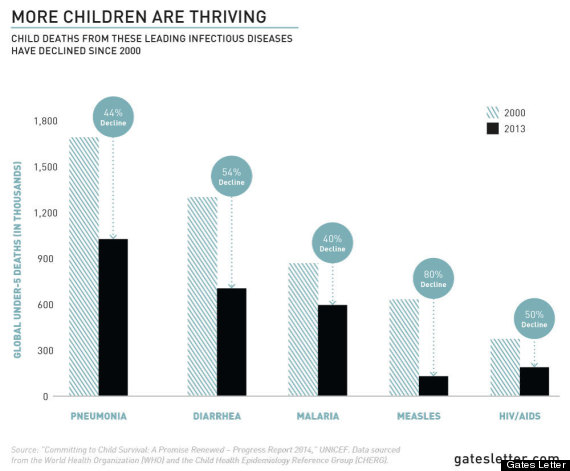Amid a heated vaccine debate, even-keeled advocates are laying out cold-hard facts, instead of getting into cat fights with those who oppose immunizations.
Some experts and pundits have resorted to slamming parents who oppose vaccines, but others, who are equally as dismayed by the campaign, have urged relying on the overwhelming figures, instead of vituperative language. Billionaire philanthropist Bill Gates, for example, recently tweeted a clear-cut infographic that delineated just how many children’s lives have been saved from infectious diseases in recent history alone.
According to the chart, which was excerpted from his foundation’s annual letter, the number of global deaths in kids from measles has dropped 80 percent since 2000. The disease was deemed eliminated in the U.S. that same year, according to the Associated Press.

But a recent spate of measles cases in the U.S. threatens to undo that progress, experts say.
According to the Centers for Disease Control and Prevention (CDC), there were at least 102 reported cases of measles in 14 states as of Sunday. California had 35 of those cases, most of which were contracted in Disneyland in December, according to the Associated Press. In Arizona alone, health officials warned that 1,000 people could have been exposed, and urged anyone with symptoms not to go the Super Bowl events in Phoenix, The New York Times reported.
And Tom Frieden, CDC director, further admonished on Sunday that the country could see a “large outbreak” of measles.
Experts attribute the sudden surge in cases to the anti-vaccine campaign.
An analysis released by the Trust for America’s health on Wednesday noted that fewer than 90 percent of babies between 19 to 35 months old have received the vaccination against measles, mumps and rubella. Advocacy group Healthy People 2020 set 90 percent as the baseline national goal for preschoolers.
Dr. James Cherry, a specialist in pediatric infectious diseases at the University of California, Los Angeles, told The New York Times that the recent outbreak was “100 percent connected” to parents declining to immunize their kids.
“It wouldn’t have happened otherwise — it wouldn’t have gone anywhere,” he told the Times. “There are some pretty dumb people out there.”
Anti-vaxxers eschew immunizations for a number of reasons.
Some still believe there is a link between vaccines and autism, even though a 1998 study that supported that theory was later retracted. Others have religious objections, while some simply want to avoid injecting “toxins” into their kids’ bodies, according to the Times.
While these theories frustrate scientists, experts recommend approaching the debate with facts, not insults.
“I part with the commentators who assume that insulting, shaming, and threatening anti-vaccination parents is the best course,” Conor Friedersdorf wrote in the Atlantic. “The best way forward is to downplay the polarizing debate about coercion, wherever one stands on it, and to focus on the reality that ought to make it unnecessary: the strength of the case for vaccinating one’s kids, as demonstrated by the scientific merits of the matter.”
President Barack Obama and leaders in the health field agree that zeroing in on the numbers is the most effective approach.
“I understand that there are families that, in some cases, are concerned about the effect of vaccinations,” Obama said in a pre-Super Bowl interview on Sunday. “The science is, you know, pretty indisputable. We’ve looked at this again and again. There is every reason to get vaccinated, but there aren’t reasons to not.”
Gates, and his wife, Melinda, who have made bringing vaccines to the poorest countries a cornerstone of their advocacy work, have also used their personal experiences to push back against anti-vaccine claims.
“[Women in Africa] will walk 10 kilometers in the heat with their child and line up to get a vaccine because they have seen death,” Melinda Gates said in a recent interview with HuffPost Live. “We’ve forgotten what measles deaths look like. We’ve forgotten … the scourges they used to be. But in Africa, the women know death in their children and they want their children to survive.”
